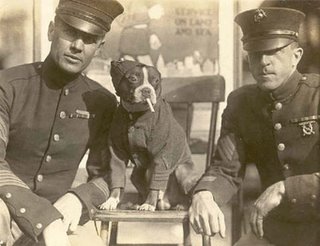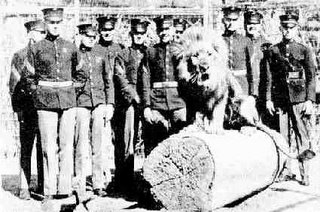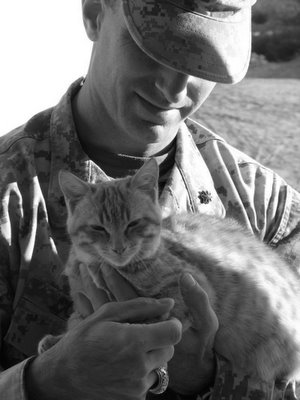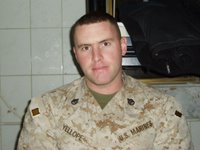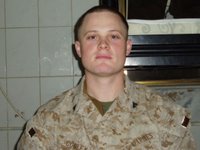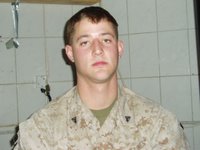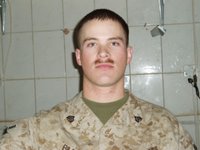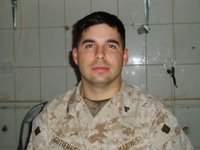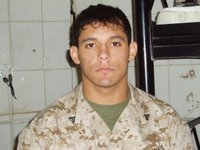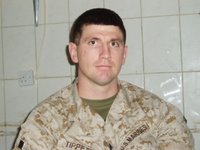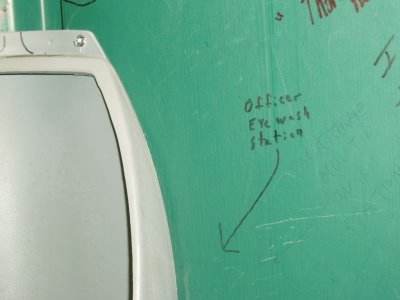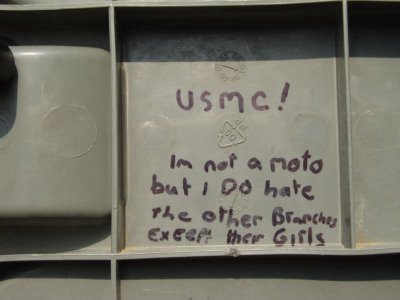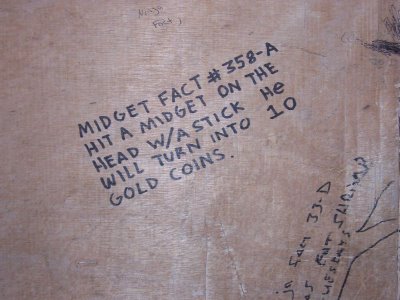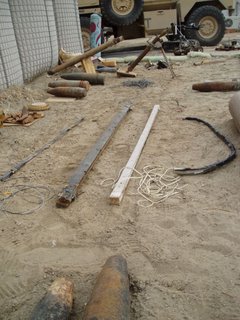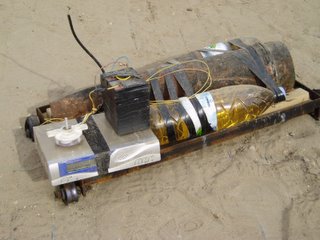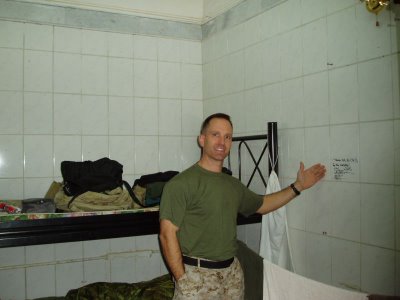 Marines and law enforcement – there is an inseparable link between the two professions. Visit any job fair aboard a Marine Corps base and you’ll find the longest line forming in front of the law enforcement booths. Police departments, Sheriff’s offices and federal agencies all offer an opportunity for young Marines to parlay their skills and interests into a career field built on a foundation of pride, professionalism, and esprit de corps.
Marines and law enforcement – there is an inseparable link between the two professions. Visit any job fair aboard a Marine Corps base and you’ll find the longest line forming in front of the law enforcement booths. Police departments, Sheriff’s offices and federal agencies all offer an opportunity for young Marines to parlay their skills and interests into a career field built on a foundation of pride, professionalism, and esprit de corps.Beyond the similarity of equipment and uniforms, each strives to enforce a universal law of nature, a law dictating the separation of good and evil. Marines and cops are society’s good guys, their inner drive fueled by the desire to weed out danger from society, be it criminal or insurgent. Good order and discipline are the hallmarks of both professions, each respecting a chain of command and the necessity to follow orders in the face of danger.
It is devotion to duty, love of country and service to fellow man that weaves the common thread between our two professions. Even in Iraq, our law enforcement brethren surround us. Dozens of Marine reservists like myself hail from various law enforcement agencies back home. Take the Marines of 5th Battalion, 14th Marine Regiment (5/14), for example. They deployed to Camp Fallujah last year to form a “provisional” Military Police Battalion instead of deploying in their traditional artillery battalion role. A number of its men are current or former Police Officers and Federal Agents, to include the Battalion Commander and his Executive Officer. They utilize their civilian skills to enhance the security and safety of the Marines deployed with the MEF, escorting convoys, guarding observations posts, and performing other quasi-law enforcement functions. Other MEF elements are comprised primarily of Marine Corps Reservists who are cops in their civilian careers. The bulk of the Marines attached to the P3 program (Police Partnership Program) are law enforcement officers at home. As P3 Marines, they train Iraqi Police recruits in the basics of community policing, search and seizure, firearms, and other law enforcement curriculum. A similar situation befalls the Marines of the II MEF (Fwd) DBE or Directorate of Border Enforcement. These Marines, many of them cops in real life, teach patrolling and policing skills to the newly formed Iraqi Border Police along the Syrian and Jordanian border.
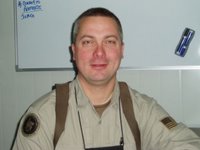 Civilian police officers have also joined the fight in Iraq. They fill the ranks of the CPATT or the Civilian Police Assistance Training Team. These volunteers are civilian cops who’ve taken sabbaticals
Civilian police officers have also joined the fight in Iraq. They fill the ranks of the CPATT or the Civilian Police Assistance Training Team. These volunteers are civilian cops who’ve taken sabbaticals from their jobs at home to deploy to Iraq and assist with the training of the Iraqi Police. CPATT includes the likes of Montcalm County Deputy Sheriff John Hannon, a man who left his family and friends behind in Michigan to deploy to Iraq and work alongside the Marines of II MEF (Fwd). His very first trip into Fallujah was interrupted by the simultaneous detonation of two IEDs against his convoy, a sobering welcome to an extremely dangerous community.
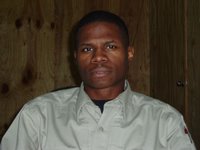 The MEF hosts a slew of civilian Special Agents from the Naval Criminal Investigative Service (NCIS), its criminal investigators and counter-intelligence agents spread throughout the II MEF (Fwd) area of operations - Camp Fallujah, Blue Diamond, and Al Asad to name a few. They routinely investigate accidental or suicidal deaths, thefts, assaults, and other felonious crimes that occasionally occur aboard the bases and FOB’s in Iraq. They are often assisted by Marine Corps investigators from the USMC Criminal Investigative Division, the “detective” arm of the USMC Military police units. At Camp Fallujah, Gunnery Sgt. Orlando Higgins works side by side with the NCIS Special Agents in an effort to help counter the occasional bad apple that sometimes finds its way into our Corps of Marines.
The MEF hosts a slew of civilian Special Agents from the Naval Criminal Investigative Service (NCIS), its criminal investigators and counter-intelligence agents spread throughout the II MEF (Fwd) area of operations - Camp Fallujah, Blue Diamond, and Al Asad to name a few. They routinely investigate accidental or suicidal deaths, thefts, assaults, and other felonious crimes that occasionally occur aboard the bases and FOB’s in Iraq. They are often assisted by Marine Corps investigators from the USMC Criminal Investigative Division, the “detective” arm of the USMC Military police units. At Camp Fallujah, Gunnery Sgt. Orlando Higgins works side by side with the NCIS Special Agents in an effort to help counter the occasional bad apple that sometimes finds its way into our Corps of Marines. 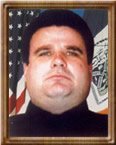 Of the twenty-three NYPD Officers killed at the World Trade Center, three were former Marines. Sergeant John G. Coughlin was an active member of the Rockland County detachment of the Marine Corps League, helping older veterans and doing honor guard duty at funerals. "He loved that," his wife said. "Once a Marine, always a Marine." One of his favorite times was the middle of December, when he would take a week's vacation to work on the Marine Toys for Tots Program. "He was a firm believer that every kid should have a toy for Christmas," Mrs. Coughlin said. He perished in the collapse of the towers.
Of the twenty-three NYPD Officers killed at the World Trade Center, three were former Marines. Sergeant John G. Coughlin was an active member of the Rockland County detachment of the Marine Corps League, helping older veterans and doing honor guard duty at funerals. "He loved that," his wife said. "Once a Marine, always a Marine." One of his favorite times was the middle of December, when he would take a week's vacation to work on the Marine Toys for Tots Program. "He was a firm believer that every kid should have a toy for Christmas," Mrs. Coughlin said. He perished in the collapse of the towers.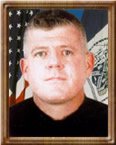 A member of Harlem-based Emergency Service Unit Truck 2 of the New York City Police Department, Michael Sean Curtin was killed in the World Trade Center attacks. He was last heard from that morning when he phoned his wife to wish her a happy birthday, his wife said. Having enlisted in the Marine Corps in 1975, he was honorably discharged at the rank of Sergeant Major. Were he still alive, he’d probably be here in Iraq, on duty with his fellow Marines.
A member of Harlem-based Emergency Service Unit Truck 2 of the New York City Police Department, Michael Sean Curtin was killed in the World Trade Center attacks. He was last heard from that morning when he phoned his wife to wish her a happy birthday, his wife said. Having enlisted in the Marine Corps in 1975, he was honorably discharged at the rank of Sergeant Major. Were he still alive, he’d probably be here in Iraq, on duty with his fellow Marines.Marines will always be attracted to law enforcement. It could be the guns or perhaps it’s the ability to carry a badge. Most likely, it’s the desire to continue the tradition of serving ones country and protecting the freedoms we so easily take for granted. There’s a great quote from the movie “A Few Good Men,” where Jack Nicholson’s character, Col. Nathan Jessup, defends the actions of his Marines in Guantanamo Bay, Cuba. During a courts martial proceeding, he speaks directly to a young Naval Lawyer who has never been in harms way, has never faced the enemy or been silhouetted in the sights of an enemy sniper. It just as easily applies to the Patrolman walking the beat, the “thin blue line” that separates good from evil back home.
Son, we live in a world that has walls, and those walls have to be guarded by men with guns. Who's gonna do it? You? You, Lieutenant Weinberg? I have a greater responsibility than you can possibly fathom. You weep for Santiago and you curse the marines. You have that luxury. You have the luxury of not knowing what I know: that Santiago's death, while tragic, probably saved lives. And my existence, while grotesque and incomprehensible to you, saves lives. You don't want the truth because, deep down in places you don't talk about at parties, you want me on that wall, you need me on that wall. We use words like honor, code, loyalty. We use these words as the backbone of a life spent defending something. You use them as a punchline. I have neither the time nor the inclination to explain myself to a man who rises and sleeps under the blanket of the very freedom that I provide and then questions the manner in which I provide it. I would rather you just said "thank you" and went on your way. Otherwise I suggest you pick up a weapon and stand at post. Either way, I don't give a damn what you think you are entitled to.
